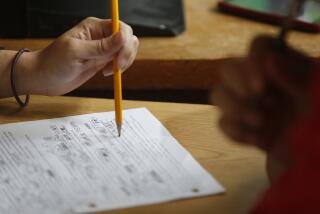Learning Facts Is a Waste
- Share via
Long ago, it was possible to know everything there was to know. The typical English peasant’s life accumulation of knowledge amounted to less than one edition of the Wall Street Journal today. Then, every bit of knowledge was important, every discovery paramount to advancing science and humankind as a whole. The successful person in those times was one who was able to sniff out information, to overhear facts and figures discussed by merchants.
Today we live in an information saturated society. For every event of our lives, personal or global, we demand accurate information, quick and precise, whether it is through our radios, telephones, televisions or computers. The person who can discern what is important from among this plethora of information is the one who will succeed.
Already, one can find a startling amount of knowledge by searching the Internet’s World Wide Web. Recently, a friend had to do a report on medieval musical instruments. A simple query into that subject returned an astonishing amount of data, including information on the American Lute Players’ Society and instructions on how to build your own hurdy-gurdy.
Have schools kept up with this trend? No. Library classes still teach students how to look up books on a card catalog, though most libraries have computerized listings of every book on the shelves and in their library network. Schools still attempt to teach students “everything there is to know,” putting students through many different classes in many different subjects. In almost all of these subjects, the student is forced to memorize facts and figures. The joy one would feel in biology, for instance, often is destroyed by the sheer amount of data that have to be memorized to pass the class. But teachers ask how it is possible to understand biology without knowing the names of every muscle group.
To answer that question, I have a story to tell about Nobel Prize-winning scientist Richard Feynman. Before World War II, Feynman was studying physics at Princeton. Some friends asked him to join a graduate course in biology. Jumping right in to a graduate class was daunting, but Feynman took the plunge. He started to read a paper describing nerve impulses. Several different muscles were named, but Feynman did not know what ones they were. So he went to the library, looked the muscles up and understood the paper. Later, when he summarized the paper to his classmates, the listeners interrupted him as he was describing the muscle groups. “We know all that,” they said. Feynman reflected, “No wonder I can catch up with them so fast after they’ve had four years already. They had wasted all their time memorizing stuff like that, when it could be looked up in 15 minutes.” It would take even less time today.
Facts are not what knowledge is about. Knowledge is about concepts and applying concepts. Data are ready at our fingertips. Why waste time storing facts in our heads when we have a quicker, faster, cheaper method of storing it already? As the information revolution swept over the world, American schools have refused to change with the flow. Teachers forbid calculators on math tests, electronic dictionaries or translators in language classes. Why? Outside of academia, electronic resources are how people do things. Those responsible for the education system need to understand that the kids they are teaching today will live their lives in the future, not the past. Schools need to focus on teaching students the path to the future, instead on hanging on to old obsolete methods.





